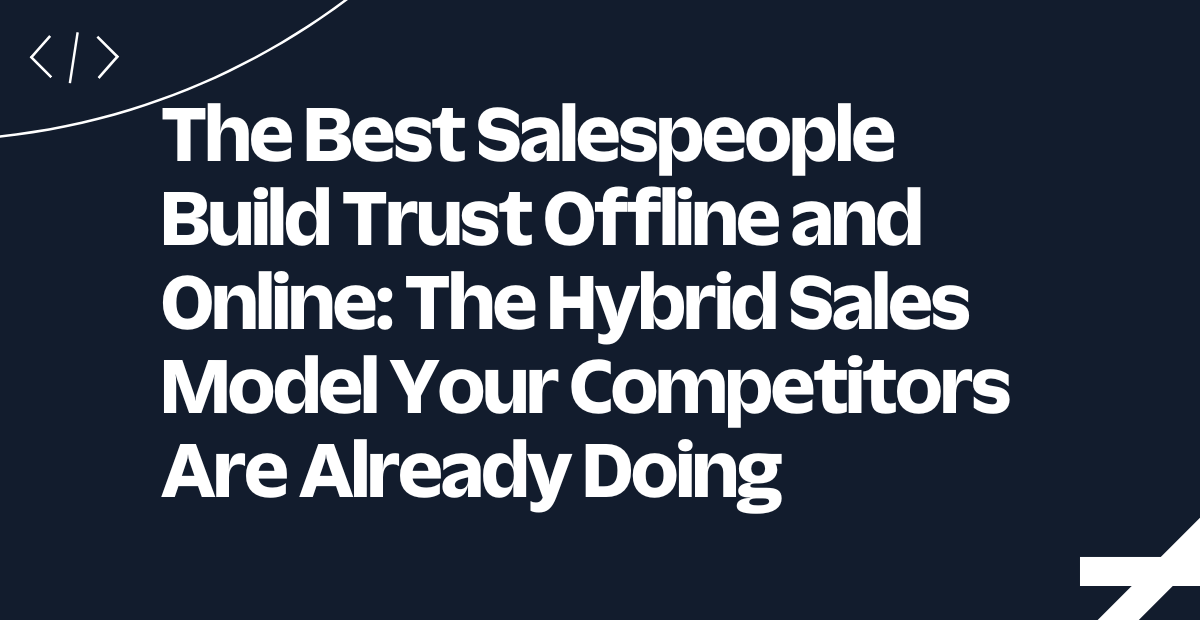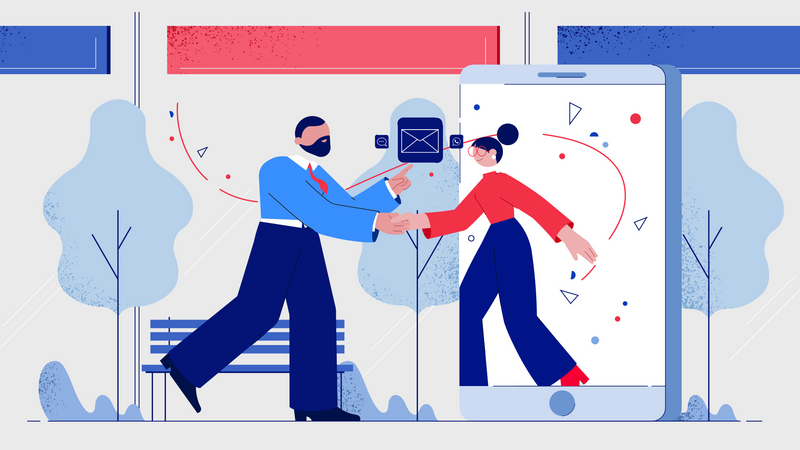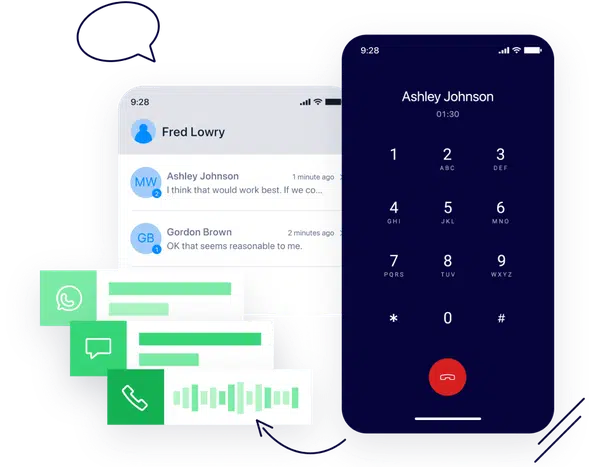The Best Salespeople Build Trust Offline and Online: The Hybrid Sales Model Your Competitors Are Already Doing
Time to read:
This post is part of Twilio’s archive and may contain outdated information. We’re always building something new, so be sure to check out our latest posts for the most up-to-date insights.

Digital selling strategies have been a mainstay of the sales world for well over a decade.
While working in sales at LinkedIn, I spoke to prospects and customers about the shifting sales landscape and the value of social selling, and leveraging their social network to find the right prospects, build trusted relationships, and exceed sales goals. In a nutshell, it meant tapping into digital channels to meet prospects and customers where they are—and where they prefer.
The best salespeople were able to establish deep levels of trust with prospects and customers offline—in-person meetings, events, and dinners—AND online—social media, voice calls, video meetings, emails, and messaging channels. The best salespeople followed a hybrid model, combining both offline and online activities to build trust with buyers.
But when the pandemic hit, sales went 100 percent online—and something interesting happened. Buyers showed they were willing to buy in this new world:
- 50% of buyers say that remote work has made purchasing easier.
- 75% of buyers want the majority of buying activities to remain digital.
- 48% of salespeople closed deals of $500,000 or more without ever meeting the buyer in person.
So, what does that mean for the future of sales?
In short: salespeople must establish trust online AND offline. They’ll continue to become more consultative and creative, async communications will open up new opportunities for differentiation, and sales leaders will work cross-functionally to support their teams with new technologies. Let’s dig in further.
The best salespeople will establish trust online and offline
A question I see a lot is, “Is virtual-first selling here to stay?”
Yes, but not by itself. Nothing will ever replace the value of a good in-person meeting.
That said, the need for routine dinners, meetings, and product demonstrations in person is going by the wayside. Buyers will increasingly feel like these tactics are a waste of time. So, hybrid selling is what’s here to stay. And the best salespeople and teams who can build deep levels of trust digitally will be the ones who win.
Establishing trust in the sales process has always been a must, but the strategies to do so have changed. When you meet a person face-to-face, the buyer intuitively makes a judgment. With the rise of video selling, that dynamic is shifting. Establishing trust and rapport requires different methods, opening the door for a new era of sales reps. It requires more frequent, high-value interactions in-between each scheduled meeting that are often initiated by the prospect or buyer. Without it, the buyer feels disconnected and the buyer’s journey becomes increasingly difficult.

Salespeople will become more consultative—and creative
In the hybrid world, it’s not just about creating a personal connection, but rather it’s about being the go-to person for thought leadership. Salespeople drive value by being strategic, creative, and valuable to extend the relationship outside the bounds of a traditional sales process.
It’s also about meeting prospects and customers where they prefer, reducing the friction in communication. In between scheduled meetings and demonstrations, we are seeing the rise of asynchronous communication:
- 51% of buyers rank at least one form of async communication in their top three preferred methods of communication with a business.
- 69% of buyers say that being able to message with a business instills deeper trust.
- There’s a 25% increase in spending with businesses that are trusted.
Why? Because buyers today value convenience, faster answers, and the ability to reference information when they need it. This is why we see salespeople give out their mobile phone numbers and open an avenue for prospects and customers to reach them at any time. They want to establish themselves as a go-to resource buyers can depend on.
Sales teams will set themselves apart with async communication
Salespeople are no longer confined to in-person meetings that are strictly about selling the product or service. They aren’t even confined to scheduled video calls and email check-ins. The buyer-seller relationship now occurs via phone, email, and texting (or other forms of messaging) in addition to in-person and video meetings.
This is a huge opportunity for salespeople.
The best salespeople are what we call ‘trusted advisors’ in their customer’s journey... Sellers today need the right tools to engage their customers where they prefer, maintain conversational integrity, and progress digital relationships. — Marc Boroditsky, CRO, Twilio
Sellers today need the right tools to engage their customers where they prefer, maintain conversational integrity, and progress digital relationships. At the same time, this needs to be done compliantly so organizations can access the data on all engagement that’s taking place.”
Personal, private communication channels like text and messaging applications (think WhatsApp for example) open a new opportunity to deepen trust levels with prospects and customers. Just getting access to these channels requires a deep level of trust. Phone numbers are exchanged in an unspoken agreement that better answers with more context can be provided faster. Salespeople aren’t expected to know the answer right away, but they are expected to get more detailed answers to the most pressing questions. And they are expected to do so in a reasonable amount of time. Ultimately, this makes them more consultative in the buyer’s journey.

If you haven’t started… you’re behind
Establishing trust digitally, and through asynchronous communication channels, is already happening today in both the B2C and B2B landscape.
For B2C, it occurs with any long-term relationship or high-value purchase requiring a direct 1-to-1 relationship between a client and a salesperson within an organization. Think about clienteling, for example, where employees are moving around a lot, either within a physical store or traveling. They still need to be constantly communicating while on the move. This is common in industries like retail, real estate, law, and wealth management.
If we look at retail, we see that mobile is always relevant and the most efficient way to communicate. B2C companies with high-value transactions will continue to differentiate by establishing 1-to-1 relationships that make clients feel like they are getting a VIP experience.
For B2B, it occurs in field sales as well as relationship management especially in industries like medical devices, pharmaceuticals, agriculture and software. For those in field sales roles, they are often mobile and personal devices are already used to build a relationship throughout the buyer’s journey. For those in relationship management roles, trust is developed over time. Go-to people like relationship managers and customer success reps build some of the deepest trust with customers because they are solely focused on making customers happy with the product or service. Typically, customers will provide personal contact information to get the responses they need when they need it. And relationship managers provide increased value by being highly responsive.
However, there are three main problems when it comes to the proliferation of communication options in a hybrid selling world:
- Rep productivity. There will continue to be more “tools” to choose from and communication channels customers expect to be able to use. WIth reps already being overwhelmed by options, how do you centralize it in a way that they see immediate business value and enjoy using the tools?
- Company visibility. Whether it’s a call, WhatsApp message, or text, communications on salespeople’s personal devices do not tie back into the CRM. That means sales leaders have no visibility into the full context of the relationship with customers. This becomes especially problematic when a salesperson leaves, taking the full context of the relationship with them.
- Security and compliance. The use of personal devices to accommodate asynchronous channels like texting and WhatsApp are a security and compliance risk. Many highly regulated industries like financial services require detailed records of official business, which isn’t possible through personal devices. When rules aren’t followed, fines are assessed. Not only is that a financial burden, but it can also dissolve trust with customers.

Sales productivity and company compliance go hand in hand
The best sales leaders of this next generation of selling will empower their teams to communicate in the way buyers prefer while working closely with their IT team to ensure it’s secure. Typically, finding a tool that makes both salespeople and IT happy can be extremely difficult. The focus of this cross-functional relationship needs to be on end user experience, sales productivity, and compliance:
- End user experience. Customers can’t be expected to be confined to email and meetings. They need to be able to communicate in the channels they prefer. On the same hand, salespeople need their sales tools all in one place – from communication channels to document management to invoicing and payments. That all needs to be integrated with their single source of truth – the CRM.
- Rep productivity. As the hybrid sales model continues to advance, we’ll see sales leaders empower their reps to handle the end-to-end sales process from their mobile devices. They’ll need to be deeply engaged with their internal product and IT teams to provide tools that allow for these interactions, and are built specifically around their business. Out-of-the-box solutions will be faster to market, but lack the customization needed to prevent gaps in the customer experience. Sales leaders, in combination with their internal partners, will become builders for their organizations.
- Compliance and security. As mentioned above, the use of personal devices poses security and compliance risks to the company. Sales leaders will need to work with their internal partners to ensure employee privacy is respected, SSO capabilities are integrated, and conversations are manageable and archived. They need to do so in a way that doesn’t skyrocket costs or eat into significant development cycles.
Hybrid selling is here to say
When it comes to the buyer-seller relationship, the digital world – and the hybrid sales model – is here to stay. As we continue to see more communication channels, video, and data incorporated into the sales process, we’ll see a rapid evolution in what it means to be a successful salesperson. The next decade is sure to bring more excitement and first than we’ve ever seen. Salespeople are creative, strategic innovators and I can’t wait to see what they build!
Related Posts
Related Resources
Twilio Docs
From APIs to SDKs to sample apps
API reference documentation, SDKs, helper libraries, quickstarts, and tutorials for your language and platform.
Resource Center
The latest ebooks, industry reports, and webinars
Learn from customer engagement experts to improve your own communication.
Ahoy
Twilio's developer community hub
Best practices, code samples, and inspiration to build communications and digital engagement experiences.


